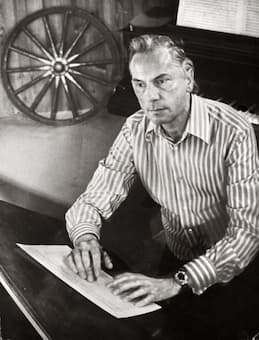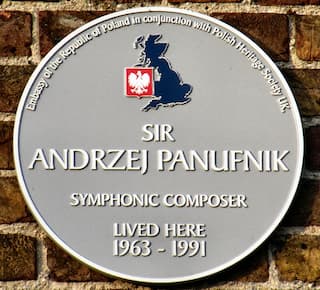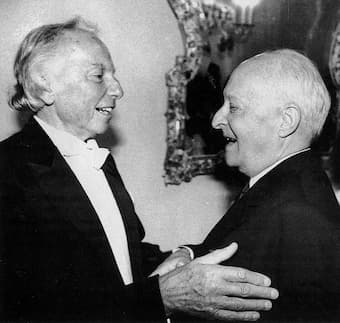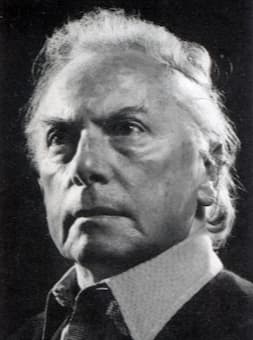
Andrzej Panufnik
Andrzej Panufnik is considered one of the most important and original symphonic composers of the 2nd half of the 20th century. As he famously stated, “In all my works, I attempt to achieve a true balance between feeling and intellect, heart and brain, impulse and design.” Born on 24 September 1914 in Warsaw, Andrzej was the son of the hydro-engineer and well-known violinmaker Tomasz Panufnik and the talented violinist Matylda Thonnes. Music was clearly part of his childhood environment, and he remembered, “In my early years I never consciously listened to my mother’s playing, but it was constantly in my ears, background music, part of the fabric of my life so that I knew in my head the concertos of Beethoven, Mozart and Brahms as well as Bach, and contemporary Polish music such as Wieniawski and Karłowicz. This music was an intrinsic part of my existence, like cleaning my teeth, eating my meals, even breathing.”
Andrzej Panufnik: Piano Trio, Op. 1 (BMF Piano Trio)

Andrzej Panufnik plaque, Riverside House, Twickenham
He started to take piano lessons at the age of eight, and he remembers that he started to compose at the age of nine. Andrzej entered the junior department of the Warsaw Conservatory, but his early musical start was cut short when he failed to pass the final examination. He did reengage at the age of 16 and in February 1932 he once again entered the Warsaw Conservatory. Eventually, he became a composition student under Kazimierz Sikorski, and he composed several works, including a Piano Trio. A critic noted, “that even at this early stage Panufnik’s music showed a high sense of individuality and many of the other traits that would later come to characterize his musical style.” He graduated from the Warsaw Conservatoire with Distinction in both composition and conducting, which he proudly demonstrated in the Conservatory gala performance of his Symphonic Variations in 1936. As a scholar has noted, “this conducting engagement began a lifelong struggle between his passion for composition and the necessity to conduct.”
Andrzej Panufnik: Tragic Overture (Sinfonia Varsovia; Jerzy Maksymiuk, cond.; Renato Rivolta, cond.)

Andrzej Panufnik with Witold Lutosławski, 1990
Little is known of Panufnik’s early musical development, but his musical attitude seems to reveal a certain number of deeper beliefs, which were shaped in his youth, perhaps even in his childhood, as more or less constant ideas. One might say that these personal aesthetics became a kind of internal mirror in which he reflected different impulses emanating from the surrounding musical world. Panufnik continued his music education with Felix Weingartner (conducting, 1937-38) at the Vienna Academy of Music, and he subsequently studied in Paris with the French Impressionist composer Philippe Gaubert, with further music explorations in London. During his time in Vienna, he became acquainted with the music of some of Europe’s most progressive composers. He writes, “I tried out the serial method on my own. At first, I thoroughly enjoyed these mental gymnastics, but soon recognized that for me its limitations outweighed its advantages… My instinct told me, however ambitious and pretentious it might seem, that I must search unremittingly for my very own new means of expression, my own new language, at any cost, to remain independent and true to myself.”
Andrzej Panufnik: Hommage à Chopin (Agata Kielar-Długosz, flute; Andrzej Jungiewicz, piano)
 On the brink of World War II, Panufnik returned to Warsaw in August 1939. In Nazi-occupied Poland, with public concerts banned, Panufnik arranged a massive amount of classical music for two pianos, which he played as a duo in underground cafés with his friend and contemporary Witold Lutosławski. His own compositions were characterized by a distinct patriotic tone, and the origins of his Second Symphony, the Tragic Overture, and some underground resistance songs date from that period. In his autobiography, Panufnik writes, “In spite of the era in which we lived, or perhaps because of it, I felt that I should turn back to my music. I had an idea to compose something very close to my native soil. One day confined to the house, I opened a small collection of Polish peasant songs, which somehow I had not looked closely at before. I was spellbound by the beauty of the melodies, together with the innocent charm of the words.” A scholar has suggested, “that all the compositions of that period resound with Panufnik’s various emotional responses to the Nazi occupation of Poland. Panufnik lost most of his closest relatives during the war, and every note of music he had composed in his first 30 years, including two symphonies, was destroyed by fire during the 1944 Warsaw Uprising.
On the brink of World War II, Panufnik returned to Warsaw in August 1939. In Nazi-occupied Poland, with public concerts banned, Panufnik arranged a massive amount of classical music for two pianos, which he played as a duo in underground cafés with his friend and contemporary Witold Lutosławski. His own compositions were characterized by a distinct patriotic tone, and the origins of his Second Symphony, the Tragic Overture, and some underground resistance songs date from that period. In his autobiography, Panufnik writes, “In spite of the era in which we lived, or perhaps because of it, I felt that I should turn back to my music. I had an idea to compose something very close to my native soil. One day confined to the house, I opened a small collection of Polish peasant songs, which somehow I had not looked closely at before. I was spellbound by the beauty of the melodies, together with the innocent charm of the words.” A scholar has suggested, “that all the compositions of that period resound with Panufnik’s various emotional responses to the Nazi occupation of Poland. Panufnik lost most of his closest relatives during the war, and every note of music he had composed in his first 30 years, including two symphonies, was destroyed by fire during the 1944 Warsaw Uprising.
For more of the best in classical music, sign up to our E-Newsletter
Andrzej Panufnik: Symphony No. 2, “Sinfonia Elegiaca” (Konzerthausorchester Berlin; Łukasz Borowicz, cond.)
